Being an informed citizen is a cornerstone of our democracy. That’s why we gathered 11 books for politically minded readers looking to prepare for election day, whether you want to learn more about voting rights, the history of partisan conflict, or the future of democracy in America and beyond. Dig in, then go vote!
11 Eye-Opening Political Books to Read This Fall
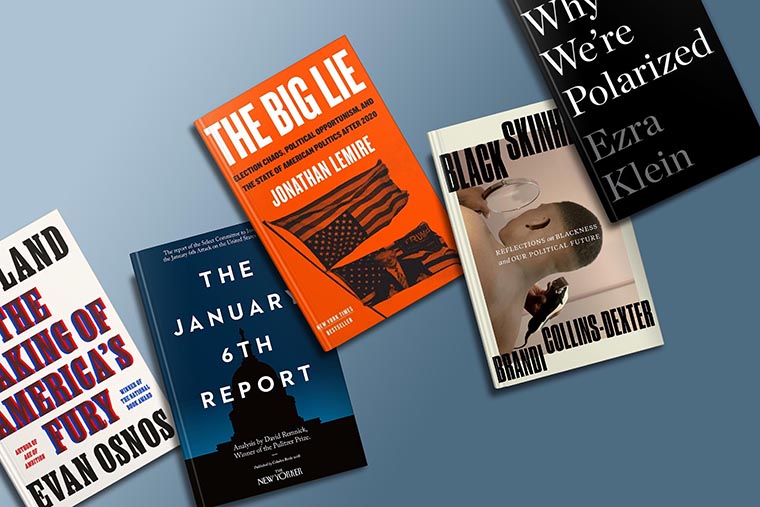
These informative political books will give readers a new perspective going into election day.
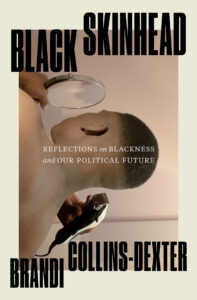
Black Skinhead
By Brandi Collins-Dexter
Political activist Brandi Collins-Dexter speaks from the heart and pulls no punches in her acclaimed debut essay collection, Black Skinhead. The timely narrative examines the complicated relationship between the Democratic Party and the Black community. Traditionally, Black voters have turned out in large numbers to vote blue. But are Democrats delivering on the campaign promises they make? And if they are, then why are Black voters increasingly dissatisfied with the party and American politics in general?
The former Senior Campaign Manager for Color of Change, Collins-Dexter is ideally suited to critique and comment on this widening divide, and she offers personal stories as well as lively interviews and political research to bring the topic into sharp focus. The result is a stirring mix of memoir and analysis that’s “timely as well as pointed" (The New York Times).
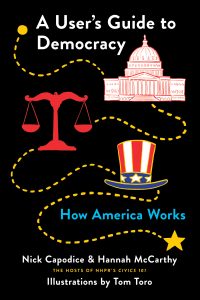
A User’s Guide to Democracy
By Nick Capodicec and Hannah McCarthy
If you want to kick the tires of American democracy and get a good look under its hood, then this is the handbook for you. Authors Nick Capodice and Hannah McCarthy host “Civics 101” on New Hampshire Public Radio; they know their stuff when it comes to politics in America. In A User’s Guide to Democracy, the pair channel their talent for unpacking and explaining the American political process into a guidebook that’s both fun and informative.
Need to know how to contact your local legislator? Perhaps you’re in need of a refresher course on the differences between the Senate and the House—or maybe you’re planning to run for office yourself! Whatever your query, you’ll find your answer within the pages of this political book, which is wonderfully illustrated by New Yorker cartoonist Tom Toro. A must-read before you head to the polls, A User’s Guide to Democracy is “an informative and appealing civics lesson for first-time voters and old hands alike” (Publisher’s Weekly).
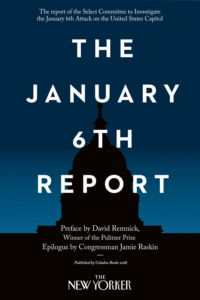
The January 6th Report
By Select Committee to Investigate the January 6th Attack on the United States Capitol, with analysis by David Remnick
We’ve all seen the footage of insurrectionists storming the U.S. Capitol on January 6th, threatening government officials and assaulting law enforcement officers as they tried to overturn the 2020 election and disrupt the peaceful transfer of power. How did such an assault on our democracy occur? In The January 6th Report, the special congressional committee tasked with investigating the attack and its aftermath presents its full and final report.
This eye-opening account draws on a year-long investigation led by nine members of Congress and committee staff. David Remnick, the Pulitzer Prize-winning editor of The New Yorker, enhances the report with his political analysis, and Congressman Jamie Raskin, a member of the committee, adds his thoughts in the epilogue. It’s a crucial document for U.S. voters to study, and a reminder of the critical importance of every vote at election time.
Pre-order your copy now, and the book will be delivered to you after the report is published by the committee.
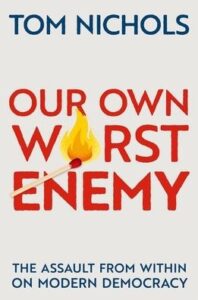
Our Own Worst Enemy: The Assault from within on Modern Democracy
By Tom Nichols
Author Tom Nichols rejects the commonly held belief that elite power brokers conspire to dismantle American democracy. Instead, he asserts that everyday citizens are responsible for the rise in anti-democratic sentiment—and we also hold the power to stem the tide. In Our Own Worst Enemy, Nichols, Professor Emeritus of National Security Affairs at the U.S. Naval War College and a staff writer at The Atlantic, dives deep into today’s turbulent political waters, tracing the spread of illiberalism from both the right and the left and urging all Americans to re-engage in politics for the sake of their communities. Narcissism, self-interest, and holding on to the grievances of the past have made us our own worst enemy, he argues. To save our democracy, we must work together.
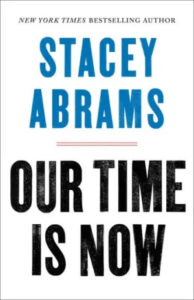
Our Time Is Now
By Stacey Abrams
As a political leader and expert on civic engagement and fair voting laws, Stacey Abrams is a voice to heed as election day draws near. In Our Time Is Now, the author combines first-hand experience on the campaign trail with thorough research to document the fragile state of voting in America, revealing the many attacks it faces from within. Written with urgency and passion, Abrams’ narrative makes plain the need for increased voter protections and offers concrete solutions to create a system where all voices are heard. This is “not a political memoir or a long-form résumé,” writes Tayari Jones for The New York Times Book Review; “rather, it is a striking manifesto, a stirring indictment and a straightforward road map to victory.”
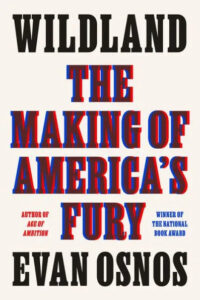
Wildland: The Making of America's Fury
By Evan Osnos
For years, Pulitzer Prize-winning journalist Evan Osnos served as an international correspondent for outlets like the Chicago Tribune and The New Yorker. But when he returned to the United States in 2013, he could sense the social and political discord roiling the country. So he decided to hit the road, all in an attempt to better understand “America’s fury.” Wildland is the result of that quest. Osnos’s probing narrative documents America’s changing political landscape from three distinct vantage points where Osnos has lived: Greenwich, Connecticut, Clarksburg West Virginia, and Chicago, Illinois. The author skillfully interweaves the individual outlooks and experiences of his neighbors with major political moments, from the shock of 9/11 to the storming of the Capitol on January 6th, 2021. It makes for a timely and compelling survey, panning from the tight focus on a single person’s story to the wide-lens perspective of fractured national politics.
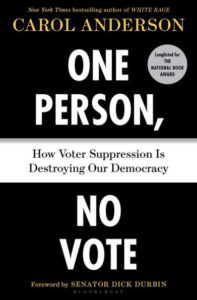
One Person, No Vote: How Voter Suppression Is Destroying Our Democracy
By Carol Anderson
From Carol Anderson, the acclaimed historian and bestselling author of White Rage, comes this urgent examination of present-day voter suppression in America. In One Person, No Vote, Anderson examines how the Supreme Court’s 2013 Shelby County decision rolled back voting rights across the country, striking down key provisions from the Voting Rights Act of 1965 and effectively allowing districts with a history of racial discrimination and voter suppression to change their voting requirements without approval from the Department of Justice. In vivid detail, Anderson chronicles the decision’s disproportionate impact on minority voters, highlighting cases of voter suppression from voter roll purges to poll closures. Anderson also champions the efforts of those who are working to restore voting access to all Americans. With each election cycle, we’re told to take pride in our democratic process. One Person warns us how quickly voting access can slip away—and that we must fight to maintain it.
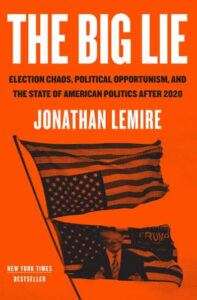
The Big Lie: Election Chaos, Political Opportunism, and the State of American Politics After 2020
By Jonathan Lemire
Jonathan Lemire is a Politico reporter and the host of MSNBC’s Way Too Early. In The Big Lie, Lemire delivers an incisive and finely-researched study of Donald Trump’s bogus claims of election fraud. The author’s tenure as Politico’s White House Bureau Chief underpins his writing, and he draws on dozens of interviews with experts to bolster his analysis. Lemire notes that Trump first floated the idea of the election being rigged at a rally in 2016, and the author traces that thread right through to the failed January 6th insurrection. Just how has Trump’s “big lie” affected politics in America and the future of our democracy? Lemire shines a sobering light on the damage it’s done to our political system, throwing democratic ideals into disarray. For all those in search of a vital political book to read in the lead-up to election day, The Big Lie belongs at the top of the list.
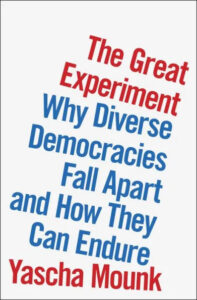
The Great Experiment: Why Diverse Democracies Fall Apart and How They Can Endure
By Yascha Mounk
Yascha Mounk, a writer and academic known for his trenchant analysis of the rise of populism and attacks on liberal democracies around the world, traces the ongoing fight for diverse forms of governance in The Great Experiment. The author draws on historical precedent, social psychology, and present-day policy trends to assess the durability of multicultural democracies, revealing their strengths, their stress points, and highlighting ways they can succeed. Publisher’s Weekly hails Mounk’s latest as a “hopeful meditation on a multicultural world” rich with “insight, nuance, and sympathy to all sides”; indeed, President Obama recommended Mounk’s narrative on his popular summer reading list. Today, we’re in the midst of deep political division and worried about the future of U.S. democracy. Mounk’s work is encouraging: He doesn’t gloss over the serious work that lies ahead, yet he still inspires hope, which is what we all need.
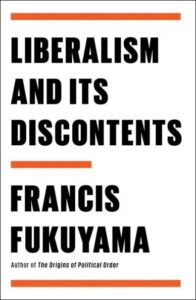
Liberalism and Its Discontents
By Francis Fukuyama
Francis Fukuyama is the renowned political thinker who wrote The End of History and the Last Man. In Liberalism and Its Discontents, the author succinctly reviews the events that have led us to our current political crisis, examining the rise in assaults on liberal democracy at home and abroad. While he gives accounts of criticisms of liberal democracy from both ends of the political spectrum, Fukuyama argues for its continuation and outlines ways for it to thrive in the 21st century. Praised as “lucid” and “insightful” by Publishers Weekly, Fukuyama’s slender volume offers an “accessible diagnosis of how liberalism went wrong and how it can reclaim its best impulses.”
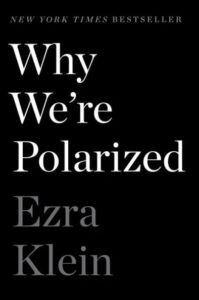
Why We're Polarized
By Ezra Klein
Just how did we end up here, with American politics so painfully divided and our democracy in peril? It’s a question asked by many over the last few years. In Why We’re Polarized, New York Times columnist and Vox co-founder Ezra Klein seeks to disentangle this knotty issue, teasing out the many forces at work in our hyper-partisan political present. Psychological and cultural elements play a part, of course, but Klein also examines the ways political institutions, the media, and technology have shaped modern discourse, producing one-sided feedback loops that drive us further apart. The author also points to identity politics as the primary polarizing influence, exploring the ways in which our racial, geographical, and cultural identities have fused with our political identities to cement our stance in the world and further an us-versus-them mentality. Thoroughly researched and elegantly written, Klein’s bestselling debut cuts through the noise to provide a “clear, useful guide through the current chaotic political landscape” (Kirkus Reviews, starred review).
Share with your friends
Related Articles
Celadon delivered
Subscribe to get articles about writing, adding to your TBR pile, and simply content we feel is worth sharing. And yes, also sign up to be the first to hear about giveaways, our acquisitions, and exclusives!
Celadon delivered
"*" indicates required fields


